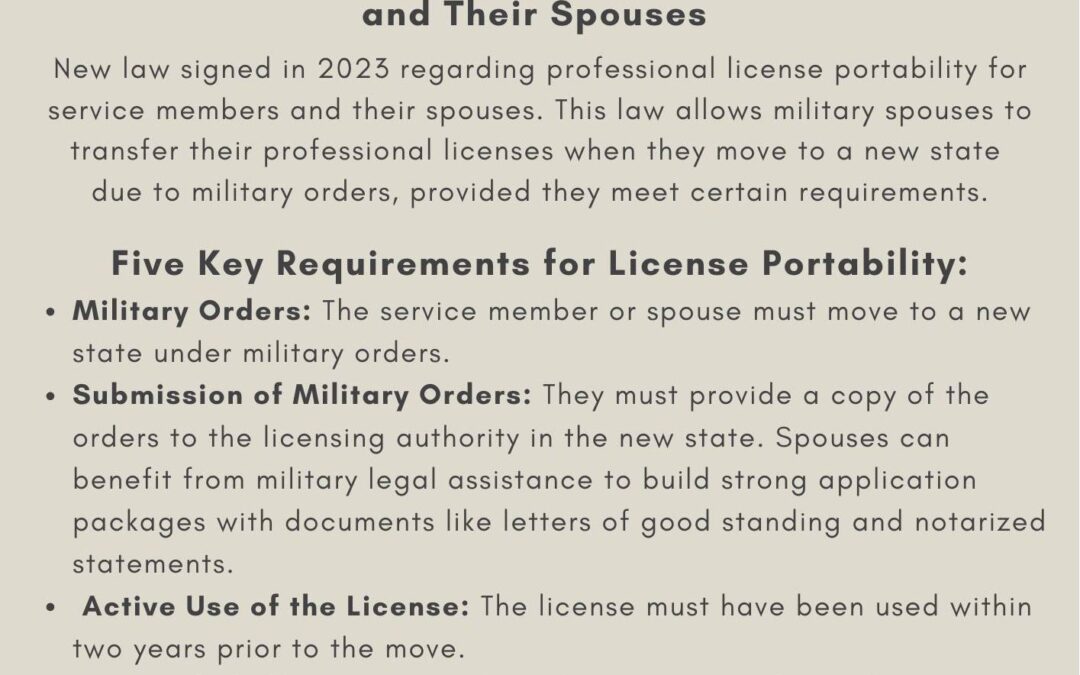New 2025 Updates Strengthen Professional License Portability for Military Spouses
For years, military spouses have faced unnecessary career roadblocks every time a Permanent Change of Station (PCS) forced them to move across state lines. Whether running a small business or holding a professional license, many found themselves stuck in red tape, waiting weeks or even months before they could legally get back to work.
Now, new federal updates are helping to change that story.
A Stronger Foundation for License Portability
Over the past few years, Congress has taken major steps to make professional license portability more than just a talking point.
-
The Military Spouse Licensing Relief Act of 2021 gave states the authority to recognize professional licenses held by military spouses when they relocate under military orders.
-
The Veterans Auto and Education Improvement Act of 2022 amended the Servicemembers Civil Relief Act (SCRA) to expand this protection — ensuring that professional licenses in good standing could be accepted across state lines (with the exception of law licenses).
-
Most recently, the Fiscal Year 2025 National Defense Authorization Act (NDAA) added new language to make those protections more permanent and clearly defined under federal law.
Together, these laws have created the strongest framework yet for military spouse license portability.
What This Means for Military Spouses
If you’re a spouse who owns a business or holds a professional license — whether in real estate, cosmetology, healthcare, or another field — these changes could make your next PCS a little less stressful.
Here’s what’s new and what you can expect:
-
You have a stronger legal foundation for requesting your professional license be recognized in your new state, as long as it’s in good standing and your relocation is tied to official military orders.
-
You may be eligible for reimbursement for license or certification costs associated with relocation — a benefit some service branches already support.
-
More professions are joining interstate licensure compacts, which help streamline recognition across participating states.
-
Fewer career interruptions: With better coordination between federal law and state licensing boards, the goal is to reduce the downtime between your move and getting back to work.
The Reality: Progress Takes Time
While these updates mark a major win for the military spouse community, implementation is still catching up. Many state licensing boards are learning how to apply the new laws, and some may interpret them differently. That means spouses may still face occasional delays or confusion when transferring licenses.
Additionally, every state still maintains its own professional standards, continuing education rules, and disciplinary requirements — so even with portability, spouses will need to stay informed about state-specific regulations.
For professions covered by interstate compacts, those compact rules will apply over federal portability laws. And it’s worth noting that law licenses are not yet included under these federal provisions.
Why This Matters
Military spouse unemployment and underemployment remain among the highest in the nation — often tied directly to relocation challenges. License portability offers a tangible, actionable solution that helps spouses maintain their careers and financial stability, while also strengthening the local economies of the communities they move to.
Each policy update brings us closer to a future where “PCS season” doesn’t mean career disruption. Instead, it can mean a smoother transition, a quicker restart, and continued success — no matter where military life takes you.
At the Military Spouse Chamber of Commerce, we continue to advocate for clear, consistent, and accessible pathways for license and business portability. If you’re a spouse navigating this process, reach out to your state licensing board early, gather your documentation, and know that the law is increasingly on your side.
Together, we’re building a future where military spouses can take their businesses — and their livelihoods — wherever duty calls.
Resources:
The Department of Justice’s Servicemembers and Veterans Initiative (SVI) is committed to protecting those who serve and their families. The Civil Rights Division enforces the Servicemembers Civil Relief Act (SCRA), which provides servicemembers and their dependents with certain civil protections related to military service.
Professional License Portability for Servicemembers and Their Spouses; U.S. Department of Justice, Civil Rights Division
U.S. Department of Justice Topics & Resources


Recent Comments